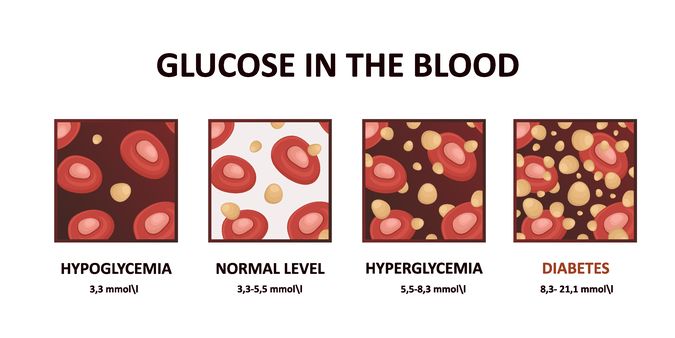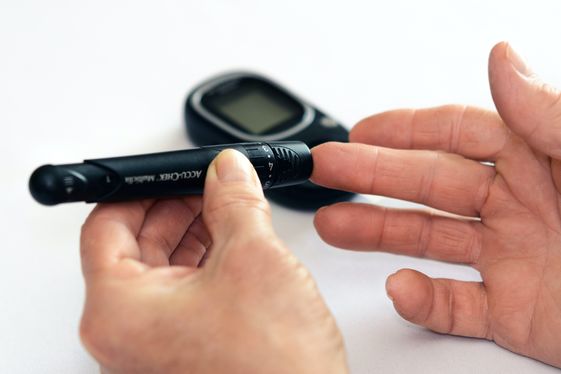How long does Metformin take to work?
 Metformin is an antidiabetic medication used to treat and to prevent type 2 diabetes. It belongs to a class of drugs known as a biguanide, which help to reduce the amount of sugar (glucose) in the blood.
Metformin is an antidiabetic medication used to treat and to prevent type 2 diabetes. It belongs to a class of drugs known as a biguanide, which help to reduce the amount of sugar (glucose) in the blood.
Diabetes is a lifelong disease that affects the body's ability to create a hormone called insulin.
Insulin is a hormone, produced by the pancreas, which helps cells to absorb glucose from the blood to use as energy.
When food is digested, enzymes in the liver break down the carbohydrates into sugars named glucose and fructose. The liver can then either store the sugar as a fat, to use as a fuel reserve, or pass the sugar straight into the blood to be used for energy right away.
If there is not enough insulin to control the amount of sugar in the blood, or if the insulin doesn’t work correctly, the level of sugar in the blood can become too high – the medical name for high blood sugar is hyperglycaemia.
If left untreated, diabetes can lead to further complications and health issues such as eye damage (retinopathy), nerve damage (neuropathy), heart disease and stroke.
Metformin is prescribed when exercise and diet have not been effective at reducing blood sugar levels. It is used alongside better lifestyle choices such as a healthy, balanced diet and regular exercise.
Your doctor will be able to provide you with a diet plan to help you manage your condition. They will also be able to provide personalised advice, such as fitting exercise into your day.
Metformin doesn’t cause weight gain unlike some other diabetes medications.
It is possible to buy Metformin online from Prescription Doctor. You will be required to fill out an online questionnaire which our doctor’s can use to assess the suitability of Metformin for you.
Carbohydrates
There is a common misconception that carbohydrates are bad for people with diabetes and should therefore be avoided.
Carbohydrates are the bodies primary source of fuel and are needed by cells. Moderation is key to eating carbohydrates as part of a healthy and balanced diet.
Too many carbohydrates can cause high blood sugar (hyperglycaemia) while too few carbohydrates can cause low blood sugar (hypoglycaemia).

Instead of cutting carbohydrates entirely, consider the kind of carbohydrate you are consuming and regulate the amount of carbohydrates you eat on daily basis.
Complex carbohydrates, such as those found in wholegrain pasta, brown rice, beans and other vegetables, are harder to break down by the body and so the energy they provide is burned slower and lasts longer.
Simple carbohydrates, such as those found in refined sugars, sweets, soft drinks, syrups and fruits, are much easier for the body to break down and absorb. Because of this, they are used up much faster and provide only a short burst of energy. In many cases, simple sugars provide little nutritional value.
These two types of carbohydrates affect diabetes in different ways. Because it takes longer for complex carbohydrates to be broken down and absorbed by the body, the impact they have on blood sugar levels takes longer to come on. Simple sugars, on the other hand, cause a spike in blood sugar levels in a very short space of time.
Diabetes UK states that following a low-carb diet or simply reducing the amount of carbohydrates you consume can help you lose weight. However, you should consult your doctor or diabetes nurse before making changes to your diet which might affect how well your medicine works.
How Does Metformin Work?
Metformin works in a number of ways to regulate and control your blood sugar levels.
Firstly, it inhibits enzymes in the liver, which break down carbohydrates into glucose. This results in less glucose to be passed into the blood.
It also blocks excess glucose absorption in your intestines. As food passes through your intestines, nutrients and sugars are absorbed through the intestinal wall and into the blood stream. By preventing this action, more sugar is passed out of the body as waste.
Finally, Metformin can help your body’s cells to react better to the insulin, allowing the glucose to be effectively transported from the blood and into the cells which need it.
Your doctor will check your blood sugar levels regularly to see how effectively the treatment is working for you. Your doctor may adjust the dosage to ensure the medicine remains effective for you.
How Long Does Metformin Take to Work?
When you first start taking Metformin, it will take around 48 hours before you feel the effects.
Maximum effects can be noticed after 4 to 5 days depending on your advised dose, but are usually seen after several months.
Your doctor will start you out with a low dose, and increase the dosage gradually if required.
You might not feel a difference while taking Metformin. Despite this, you should not stop taking Metformin unless your doctor has informed you that it is safe to do so.

How long will I need to take Metformin for?
It is likely that you will be on Metformin for the rest of your life.
Diabetes is a lifelong condition which increases increases the risk of various conditions, including cardiovascular events such as heart attacks and stroke, artherosclerosis, nerve damage known as neuropathy and eye damage such as retinopathy.
Following diagnosis, your blood sugar levels will be needed to be monitored regularly to ensure the treatment is and remains effective.
Your doctor will discuss how to manage your condition and mitigate the risk of complications arising. They may refer you to specialists, such as a podiatrist (foot specialist) or ophthalmologist (eye specialist), to check for signs of complications, such as neuropathy and retinopathy.
How Long Do the Effects of Metformin Last?
Metformin comes in two different variants - normal, and slow release tablets. It’s also available as a liquid for those who can’t or struggle to swallow tablets.
Normal standard release tablets work faster, though you may need to take more medication throughout the day depending on what your doctor has advised. Some Metformin tablets can be crushed and added to meals, but you can’t do this with slow release tablets.
Slow-release tablets take a longer time to dissolve and so work for a longer period.
Metformin stays in your body for up to 4 days.
When Should I Take Metformin?
Metformin should be taken alongside a meal. Depending on your dose, you will usually take Metformin with breakfast. The tablet(s) should be swallowed whole with a glass of water.
You should avoid drinking grapefruit juice when taking Metformin. Grapefruit can interact with the effectiveness of Metformin and increase the risk of Metformin-induced lactic acidosis.
Metformin comes in different strengths, so your doctor will tell you how much to take. Always follow your doctor’s prescription.
Do not exceed the maximum dose of 2,000 mg (4x 500 mg tablets) per day.
If you accidentally take more Metformin than you should, seek medical advice from your doctor, GP or by dialling the NHS 111 number for advice.
If you are unsure how and when to take Metformin, speak to your doctor.
What if I Miss a Dose of Metformin?
If you miss taking a dose of Metformin, take it as soon as possible. If it’s almost time for your next dose, skip the missed dose and continue with your routine as normal. Do not take more metformin to make up for the dose you missed.
If you have a tendency to forget when you should take your medication, try setting an alarm on your phone to remind you when to take it.
Can I Drink Alcohol While Taking Metformin?
While you can drink whilst taking Metformin, it is advisable that you drink no more than 2 units (a standard glass of wine, for example) a day.
Avoid binge drinking or drinking in excess of the recommended weekly limit of 14 units.
Drinking alcohol increases the risk of low blood sugar levels (hypoglycaemia). It also increased your risk of lactic acidosis.
What is Lactic Acidosis?
Lactic acidosis is a serious condition which can develop due to taking too much Metformin or excessive drinking. The condition causes a build up of lactic acid (L-lactate) in the body, which lowers the blood’s pH level, making it more acidic.
Lactic acidosis is rare and is estimated to affect only 6.8 of 100,000 people taking Metformin.
Symptoms of lactic acidosis include:
- Fruity-smelling breath (a sign of keto acidosis)
- Confusion
- Jaundice
- Difficulty breathing
- Exhaustion or fatigue
- Muscle pain
- Weakness
- Stomach pain
- Diarrhoea
- Headache
- Rapid heart beat
- Decreased appetite
Lactic acidosis is a medical emergency. If you notice the symptoms of lactic acidosis, go straight to the accident and emergency department of your nearest hospital.
Authored & Reviewed By

Mohamed Imran Lakhi
MPharm - Lead PharmacistPublished on: 05/02/2020 Reviewed on: 18/05/2023
© 2013 - 2025 Al Muhsineen Limited. All Rights Reserved. Registered Pharmacy: 34 Halliwell Road, Bolton BL1 8RL. Registered Office: 254 First Floor, Shearbrow, Blackburn, England, BB1 8DS





